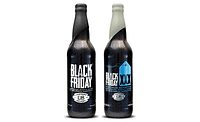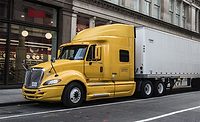Atlas Distributing tackles driver recruitment, retention
Driver training facilitates safety on-site and on the road

Ask a group of fleet managers what keeps them up at night and a recurring theme across most of those conversations is likely to be “hiring and keeping qualified CDL drivers.”
Recruiting and retaining qualified delivery teams has been one of the biggest challenges for beverage distributors of all sizes in recent years and it’s something that Atlas Distributing, Auburn, Mass., has been proactive in addressing.
“The industry is struggling as a whole, finding the right drivers to fit their needs,” says Atlas Operations Manager Brian Lundberg. “It’s been so different from the way it used to be. In the past, we’d have no problem having drivers come on board and then retire from here. But in just the last few years, things have changed and we’ve had to focus on figuring out how to get the next person.”
Atlas recently started working with external HR companies to assist in the company’s driver recruitment efforts. “They’ve really helped us and allowed us to get more creative than other companies to get these drivers on board,” Lundberg says.
In the past, few would have foreseen a time when beer distributors were hosting on-site career fairs, but it’s become an effective method for Atlas to scout new talent for its delivery team. Another has been to expand the distributor’s marketing efforts across its operational footprint.
“We’ve started putting signs on trucks: ‘Atlas is hiring Class A and B CDL,’ those kinds of things,” Lundberg notes. “That seems like a small thing, but a lot of drivers have been coming in since we started to do some of this.”
However, recruitment is only the beginning. “Once we get them in here, the next step is to figure out how to keep them here,” he continues. “We have to continue to sell them on the job even when they’re in the door.”
The key is to keep the new hires as engaged as possible without cutting corners on the necessary training and safety orientation procedures, he explains.
Atlas employs the Smith System safe driving program for all new hires and retests each driver once every other year, unless there is an accident.
Every driver undergoes a 60-day probationary period with two reviews, one just before day 30 and one prior to day 60. During that period, drivers are evaluated on driving ability, safety awareness both on the truck and at retail accounts, and proper product handling, among other tasks.
“How do we get through all of those important steps, including safety and equipment training, and get them on the road as quickly as possible so they don’t feel out of touch with [the on-the-road] aspect of the job,” Lundberg ponders. “We’re working through that right now, taking it as we go.”
Delivery staffers typically start out as helpers and are assigned to seasoned drivers before transitioning to drivers after they’ve received positive evaluations from more experienced team members.
All drivers are trained on warehouse equipment and safety procedures as well, because many drivers end up working in the warehouse. Atlas includes that facet of the training during the onboarding process so it doesn’t slow team members’ momentum down the road, Lundberg says.
Safety training doesn’t end at orientation, as it is ongoing for all staff members. Atlas regularly invites state and local police, as well as experts who are knowledgeable about Department of Transportation (DOT) policies and any changes to those regulations. A representative of Ryder often comes in to bring drivers up to speed on equipment-related enhancements and how to safely operate the newest trucks.
Delivery staff members also have responded well to Atlas’s on-site fitness training initiatives. The company regularly invites a personal trainer to educate drivers on beer delivery-specific fitness techniques.
“People aren’t necessarily working out on-site, but the trainer comes in to talk about things like proper stretching,” Lundberg explains. “She actually went to our building to figure out how much a keg weighs, how to lift it right, and other techniques you can apply as you approach your delivery day — how to make your body work the right way on this sort of job.”
After all, “delivering beers is one of the most physical jobs out there. When you’re out there moving beer all day, it’s not easy,” Lundberg says. BI
Atlas Distributing
Founded: 1933
Owner/President: Joe Salois
Annual volume: 5.5 million cases
Total employees: 225 employees(including 50 delivery drivers)
Key suppliers/brands distributed: MillerCoors, Constellation, Heineken, Boston Beer, Mike’s, Yuengling, New Belgium, Harpoon, NAB, Diageo, Narragansett, Wachusett, Shipyard, plus many regional and local craft brands
Delivery areas: Central Massachusetts
Fleet makeup: All trucks are Freightliners (tractors, straight trucks and non-CDL units) with rear roll-up doors and no sideloaders: 11 36-foot tractor/trailer Class A units (two city side doors on each side, lift gate and ramp on rear); 18 26-foot tandem axle straight trucks (Class B with two city side doors on each side and a ramp on rear); three non-CDL straight trucks (one city side door on each side, lift gate and ramp on rear); one 14-foot Isuzu NPR, Draft Trailers for special events; nine Chevy Express Vans (merchandising fleet); and 15 Ford Transit Vans (merchandising fleet).
Looking for a reprint of this article?
From high-res PDFs to custom plaques, order your copy today!





